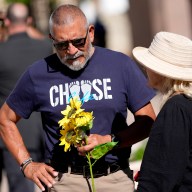It’s been one year to the day since an earthquake with a magnitude of 7.0 struck Haiti, killing some 230,000 people and leaving more than 1.5 million homeless.
Just hours after the quake hit, the international medical aid group Doctors Without Borders (MSF) arrived in Haiti.
“The need for care was immense,” says Francisco Otero y Villar, a mission coordinator for MSF in Haiti recalls. “We don’t have people injured from the earthquake any longer. Now people need help with diseases that come as an effect of the quake.”
The chief medic works at the emergency hospital of Bicentenaire, a shabby former dental clinic located in the slums of Port-au-Prince, where violence, gang fights and rape have become a part of everyday life.
“Patients cannot go to public hospitals, as there are almost none left in the city. About 60 percent of them were destroyed in the earthquake,” says Otero.
I take a ride in a well-worn 4×4 vehicle on nearly impassable roads to Tapis Rouge, a squatter community that emerged on the southern hills of Port-au-Prince following the quake.
Today more than 14,000 people live in the settlement. The sanitary conditions are among the worst out of the city’s camps. Diseases transmit through every possible means as people share what little squalid space they have with goats, rotting rubbish and sewage.
About 90 percent of the people in Tapis Rouge need humanitarian aid to have a chance of surviving. The first case of cholera in the camp was reported in early December, and the numbers of infected people have increased since.
“In the camp, almost everyone is ill in some way,” says Joseph Dessalines, a Haitian doctor at MSF’s mobile hospital in Tapis Rouge. Skin and pulmonary diseases caused by cramped and unsanitary conditions are most common, he says.
“When it rains heavily on this rugged terrain — it has already happened three times since the earthquake — the ground of the camp fills up with water and mud. People then panic as their makeshift homes begin to collapse,” Dessalines says. “People have been here for almost a year now, and they have not seen any changes. Their frustration then turns to violence.”
The latest turmoil to hit Haiti was the disputed presidential election in December, when there were accusations of electoral rigging. Riots led to the shutdown of the airport, cutting the route for aid coming into the country. Haitians’ confidence in the authorities lessens each day.
“When the authorities get the aid, they sell it,” says a woman in a camp. “There are no changes to be seen.”
“Thousands live under the exact circumstances as just weeks after the earthquake,” Otero says. “What will happen to them? Very little has been made to help these people and rebuilding their homes.”
Trauma after the quake
Even after Haiti’s quake a year ago, many locals still suffer from post-traumatic stress disorder, but few understand that the earthquake is the reason why they feel bad, according to social worker Roudy Metelus, a Port-au-Prince native who works in the Tapis Rouge camp.
“We are trying to explain to people that they do not have to feel ashamed about going to see a psychologist,” Metelus said. “Many are badly affected by the living conditions here. Many children lost their parents and still suffer from that.”
Metelus and his team of social workers from Doctors Without Borders have been searching camps since a week after the earthquake looking for people in need.
Last week they found a girl with a large, open wound in her arm. As the doctors took care of the girl, the team found out she was an orphan living with her aunt whose husband beat both his wife and the girl.
“A psychologist went to talk to the man to make him understand that what he did is wrong,” said Metelus.
The man stopped, but it is unlikely that he will be put on trial for what he did, Metelus adds. Not when it happens here.














